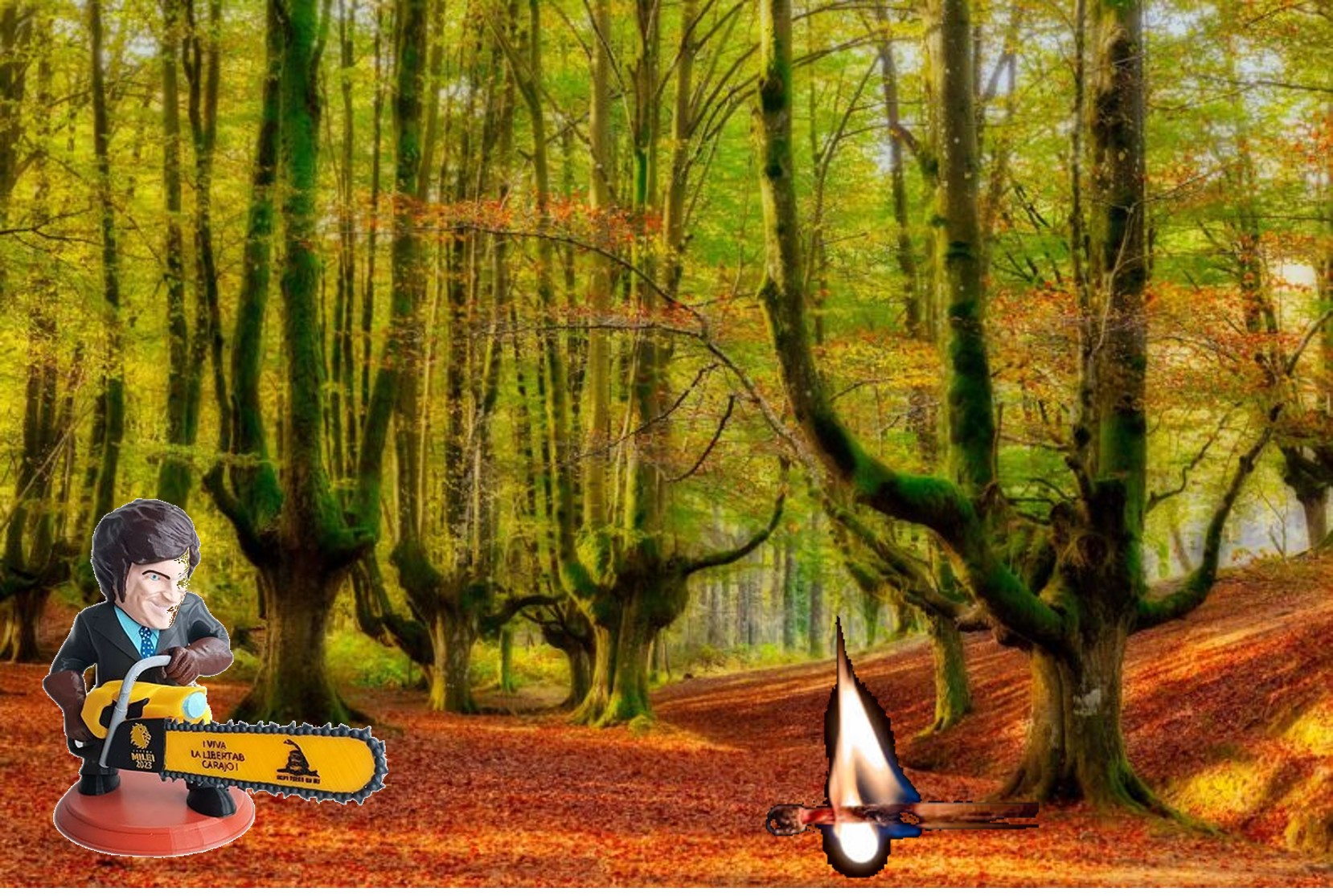Please no more mythical Basque grandmothers!
- Today I've had the sleepless night of confinement, and after four o'clock in the morning I started watching the movie Zer eta amama. I've woken up (or almost woken up) from the post-movie mourning and read an article that links orchards and our "grandmothers." Lack of sleep has refined my emotions, my attention and my patience, and I've become angry.

Once again, "Basque love(s)"; symbolic grandmothers without body or voice; the 80 grandmothers of Oteiza; the amamas with which the descendants relate. Grandmothers, considered by men. I'm convinced that there's a big difference between confessing and reproducing some ideas. And when men make the declaration of women* to us, I find it suspicious. Rather than denying one’s own privileges, showing the work done by others and continuing to link those others – in this case women – with some jobs, is it not easier for them? Suspect.
I have been researching seeds and cultivated varieties for several years. To the surprise of many, from anthropology. From the very beginning, instead of linking to a near past that we often idealize, I have focused on current relationships, practices and knowledge. Yes, because they were. But it will be because we are (and). And we are because we are. Furthermore, I believe that these relations and genealogy between past, present and future are not so natural, but must be questioned.
Little research has been done on why both did seed harvesting work in the Basque Country.
Those who want to join the present, yes, but those who refer to the past have become commonplace in my research career. Frequently performed by men. Often, questioning a general "grandmother." "The seeds kept by our grandmothers" are the "from here" seeds that we have today. They say. On the contrary, very little research has been done on how, where and which seeds were kept in the Basque Country. Even less, why some and not others (say) performed these tasks. In case I am not mistaken, I am not against women visiting the jobs they have done for the roles they have historically been assigned. The importance of these works must be recognized and the importance of the work carried out by women and their logics must be investigated, collected and disseminated. However, we should not build fixed, essentialist and naturalizing links between these women and these works. And again, when men make that confession, it's suspicious.
In the film, love appears creatures in one of the most conflicting moments between the father and the daughter. The father asks the daughter, without waiting for an answer, if she knows why she sows those seeds. The same father responded immediately: "because they retain the wisdom of our ancestors." When talking about seeds and local varieties, it is often stressed that seeds are more than just objects that are going to be sown and fertilized. In the seeds, wisdom accumulates. Seeds are the vehicle of the survival of different ways of life, the stimulus of autonomy. Seeds are the result of the relationship between the environment and the human being. The seeds are rooted. In fact, these seeds have been preserved and produced year after year and often from generation to generation. The seeds of the best plants have been selected, well preserved, shared and replanted, giving rise to variations and naturalization. Along with these variants, we have built knowledge, emotional ties, rituals and beliefs. So we say that seeds are not just seeds. They're not just the basis of the next harvest. But they are too.
As has been said, these seeds have often gone from generation to generation. They've been linked to the hamlet. Not always, however, and through other avenues they are also opening and maintaining. We're there. Reality is not so monolithic. But yes, seeds are the way to bring generations together and create genealogies. I think it is an interesting and fruitful road. Seductive and suggestive, as always, feminist and ecofeminist thinker Donna Haraway – biologist and philosopher, among other things – challenges us in one of her latest texts: building fraternal relationships beyond reproduction and genealogy, even beyond the category of species. We relate kinship not only to the creation of life, but to the close and stable relationships that sustain life, which are not only "blood" or "vertical". The feminist anthropologist Mari Luz Esteban invites us to consider relations between equals and networks and communications of mutual support (forgiveness, communities) as a relationship of kinship. And it is that, too often, the rope that binds these potential grandmothers is suffocating; in others, the same rope confers rights and recognition to violent relationships; finally, many of the relationships that are fundamental to us are invisible and nullified by that close kinship and by the laws, norms, responsibilities and rights that derive from it.
Can you understand our relationships with seeds from parenthood? I think so.
So can we understand our relationships with these seeds from affinity? I think so. We need each other, we have incredible care and attention with the seeds, we identify and identify ourselves, they are often linked to the farmhouse and we build the affectivity around them. Anyone who has kept a seed in these years knows what I am talking about. Yes, I think so. Let's build close relationships with the seeds. Let's confess them. But not anyway.
In line with Esteban, Haraway tells us that we don't always build kinship for generations.
No more mythical grandmothers in a society ruled and ruled by men!
It goes beyond genealogies. And I agree with that, but I think that rather than discarding genealogies, we have to build them in a different way. We put into our family trees those who are not in the chain of 80 amamas. From feminism, many other genealogies have also been highlighted. To understand who we are, we have to problematize where we came from and reconstruct it. So let's build genealogies. Let's stick to it, if that's our wish. With seeds, with husbands, with land or with machines, as Haraway proposed to us. But we do not reproduce the relationships and roles that have led us to situations of dependence. In the name of a hypothetical Basque identity (or not), please no more mythical grandmothers in a man-oriented and regulated society!
Bidali zure iritzi artikuluak iritzia@argia.eus helbide elektronikora
ARGIAk ez du zertan bat etorri artikuluen edukiarekin. Idatzien gehienezko luzera 4.500 karakterekoa da (espazioak barne). Idazkera aldetik gutxieneko zuzentasun bat beharrezkoa da: batetik, ARGIAk ezin du hartu zuzenketa sakona egiteko lanik; bestetik, egitekotan edukia nahi gabe aldatzeko arriskua dago. ARGIAk azaleko zuzenketak edo moldaketak egingo dizkie artikuluei, behar izanez gero.
You may not know who Donald Berwick is, or why I mention him in the title of the article. The same is true, it is evident, for most of those who are participating in the current Health Pact. They don’t know what Berwick’s Triple Objective is, much less the Quadruple... [+]
The article La motosierra puede ser tentadora, written in recent days by the lawyer Larraitz Ugarte, has played an important role in a wide sector. It puts on the table some common situations within the public administration, including inefficiency, lack of responsibility and... [+]
Is it important to use a language correctly? To what extent is it so necessary to master grammar or to have a broad vocabulary? I’ve always heard the importance of language, but after thinking about it, I came to a conclusion. Thinking often involves this; reaching some... [+]
The other day I went to a place I hadn’t visited in a long time and I liked it so much. While I was there, I felt at ease and thought: this is my favorite place. Amulet, amulet, amulet; the word turns and turns on the way home. Curiosity led me to look for it in Elhuyar and it... [+]
Adolescents and young people, throughout their academic career, will receive guidance on everything and the profession for studies that will help them more than once. They should be offered guidance, as they are often full of doubts whenever they need to make important... [+]
It will be two or three weeks since I read it, in a column by Maialen Akizu. Aner Peritz brought with him what he said on TV: “Bertsolarismo is what has led me not to interact with zis hetero men, because bertsolarismo is what has made me dissident, and also because... [+]
If that's the fear. Donald Trump seems to have come to occupy Washington’s rounded office for a long time. He has a second mandate, but to his close advisers, confirming that he is not joking, he also mentions his rigid goal of changing some isolated numbers in the Constitution... [+]
Ansorena´tar Joseba Eneko.
Edonori orto zer den galdetuz gero, goizaldea erantzungo, D´Artagnanen mosketero laguna edo ipurtzuloa, agian. Baina orto- aurrizkiak zuzen adierazten du eta maiz erabiltzen dugu: ortodoxia, ortopedia, ortodontzia... Orduan (datorrena... [+]
“Bag of resilience”, “survival manual”, “backpack of evacuations”: that’s what you can hear in the mouths of the authorities in recent weeks.
Among the declarations of the past month, the European Union has asked the population to prepare a “survival kit” to... [+]
It’s not Christmas Day, it’s Christmas Day that we Basques need. Once a year there are repeated calls from potential patriotic parties and groups, on these dates, the homeland of the Basque Country is the Basque Country/Euskal Herria around the proclamation. It's a matter of a... [+]
Last week I had a nice meeting with a group of women that I hadn’t seen for a long time, and we talked about doing it, linked to spaces of technology and creation.
The oldest of these women, who is on the frontier of retirement, is a programmer and enjoys programming code... [+]
Hainbatetan esan izan didate arkitektoen lanaren gauzarik indartsuena dela ekoizten duguna betikotu egiten dela. Eraikinaren betikotasunak gizakiaren presentzia tenporala gainditzen duela eta geroko etorkizunean iraunkor egingo gaituela. Eta liburu batekin gertatzen ez den... [+]
Many Basque feminists have been disappointed to learn that writer Chimamanda Ngozi Adichie has externalized pregnancy, meaning that a surrogate has fertilized her baby for money.Adichie is the author of the essay We should all be feminists, among others. They have ignored the... [+]
We have had to endure another attack on our language by the Department of Education of the Government of Navarre; we have been forced to make an anti-Basque change in the PAI program. In recent years, by law, new Model D schools have had to introduce the PAI program and have had... [+]

















